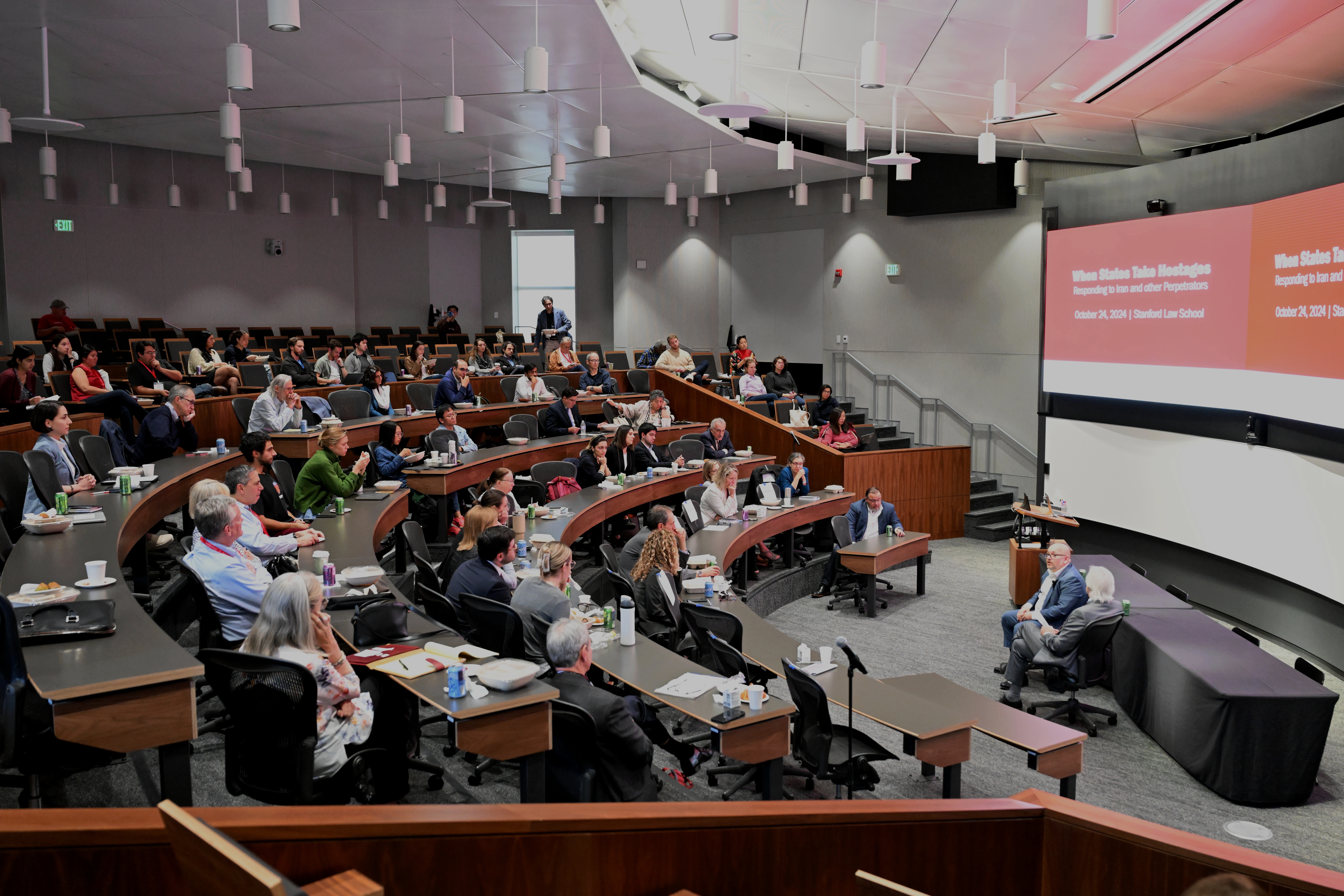Academics and public officials called for collective international action to crack down on state hostage-taking and develop policy and legal innovations to hold perpetrators accountable — with a particular focus on Iran — at a Stanford Law School (SLS) event on Thursday.
The half-day event also featured a panel discussion on the international law frameworks for hostage taking and a conversation with Jason Rezaian, a former Tehran bureau chief of the Washington Post who was taken hostage by the Iranian government. Moderated by Jon Alterman, senior vice president and director of the Middle East Program at the Center for International and Strategic Studies (CSIS), the discussion was part of SLS’s hostage summit.
Although terrorist groups have historically utilized hostage-taking as a tool of diplomacy, 90% of new American hostage-taking cases are connected to adversary states around the globe such as Iran, Russia, China, Syria and Venezuela. The number of Americans taken hostage by foreign governments has nearly tripled over the past decade, according to the James W. Foley Legacy Foundation.
“It is completely unacceptable to use people as arms to leverage against states,” said Tara Denham, Senior Official for Hostage Affairs in the Canadian government. She condemned the use of state hostage-taking as a substitute for diplomatic interactions.
“The calculations were based solely on the ability of the state actor to use the citizens of another country to assert influence and change the foreign policy decisions [or] trade negotiations,” Denham said.
Panelists analyzed the competing objectives of the U.S., European countries and Iran in hostage-taking, noting that the practice of making concessions to adversary states can encourage further hostage-taking and support other hostile actions.
The U.S. State Department gave $6 billion to Iran in a September 2023 prisoner swap and declared the funds cannot be used in terrorist operations. However, the former Iranian president Ibrahim Raisi announced in a NBC interview that Iran would utilize the unfrozen assets “wherever we need it.”
“At the end of the day, as a government, we will continue to do all this work on how to make sure that hostage-taking is not accepted as an international practice,” Denham said. “But at the same time, we do have this competing dynamic… [governments] have to make tough choices when it comes to all this.”
Panelist Dani Gilbert, an assistant professor at Northwestern University, said hostage-taking has evolved into a new form of diplomacy in state-to-state relations, with governments using their criminal justice system to take foreigners hostage. Gilbert emphasized that repressive states have employed this tactic to take advantage of Western democracies and their respect for sovereignty and the international rule of law.
“There are not a lot of ways that a state like Iran can get things from the U.S., but taking our citizens has demonstrated for a long time that it is one way to do that,” Gilbert said. “It is this unique confluence of attention to civil liberties… It matters when a citizen is detained unjustly, which contributes to increased attention and political pressure on democratically elected leaders.”
In particular, Iran has engaged in hostage-taking as an “effective asymmetric tool” to gain leverage over much more powerful adversaries, Gilbert said.
“I don’t know any other country where hostage-taking has been an essential part of their policy and practice,” said Abbas Milani, the Hamid and Christina Moghadam director of Iranian Studies. Milani noted that hostage-taking has cost the Iranian government billions of dollars in sanctions.
“They have not paid the price,” Milani said. “If they weren’t rewarded for their malfeasance, then we would not be talking about a regime that is absolutely self-righteous.”
Iranian hostage-taking is part of the regime’s broader destabilizing agenda, including its efforts to advance transnational repression, disinformation and support for terrorism, the panelists said. Although the Iranian government has predominantly taken foreigners and dual citizens hostage, its own citizens have also been victims.
Abram Paley, the U.S. State Department’s deputy special envoy for Iran, told the audience that the world must focus on what Iran is doing to its own people, adding that the international response should be geared towards all of Iran’s domestic and foreign policy tactics.
Speakers urged the importance of coordinating multilateral efforts among the international community to condemn state hostage-taking and impose punishments on Iran and other governments. For example, Canada has pioneered the creation of an initiative against arbitrary detention in state-to-state relations.
“When you bring more and more countries together to speak up against this type of behavior, you increase pressure on [the perpetrating] country,” Denham said. “Whether or not they do care about their international reputation, they definitely care about their reputation with other countries they work with.”
Panelists emphasized the Iranian government targets certain subsets of foreigners, including particularly high-profile and influential individuals such as celebrities, academics, journalists and human rights activists in its calculations of hostage-taking. Paley, however, urged all Americans to avoid visiting Iran.
“We are trying to make very clear [that] if you are an American, you should not go to Iran,” Paley said. “This is not just a U.S. government talking point… It’s something that we mean and that we need to be very careful about.”
